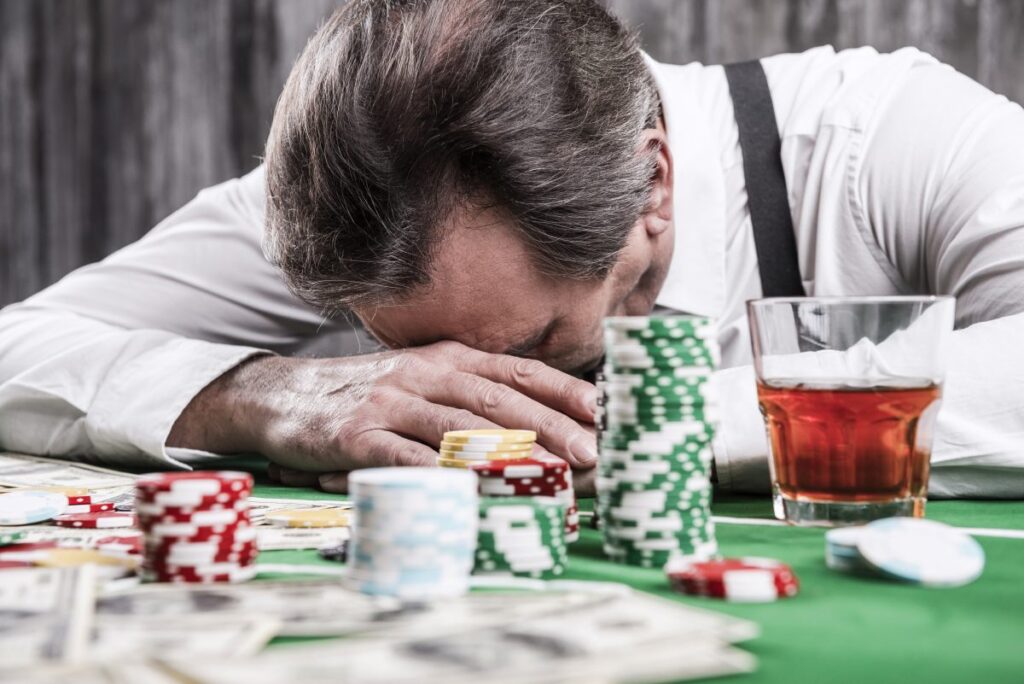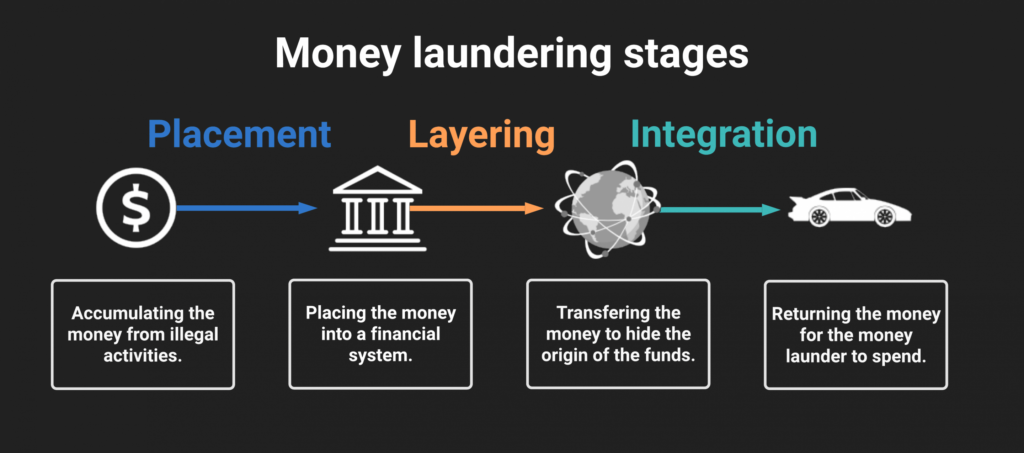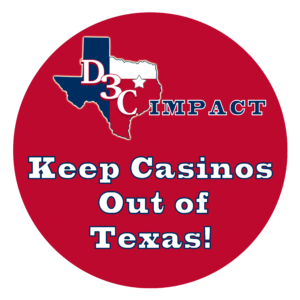
Welcome to StopTexasCasinos.com
OUR MISSION is to educate YOU about harm caused by Casino Gambling. We believe that casinos bring a host of social and economic problems that far outweigh any potential benefits. By raising voter awareness, advocating for responsible legislation, and providing information to voters, we strive to keep Texas free from the negative impacts of casino gambling.
WHY WE OPPOSE CASINOS:
- Economic Impact: Casinos often promise economic growth, but the reality is that they can drain local economies by redirecting spending away from local businesses. Casinos can lead to economic instability for them.
- Crime Prevention: The presence of casinos often correlates with an increase in crime rates.
- Social Consequences: Gambling addiction and family disruptions are just a few of the social issues that can arise from the presence of casinos.
- Community Well-Being: We value the integrity and well-being of our communities and believe that casinos undermine the social fabric of our society.
TAKE ACTION:
Your voice matters. Join us in our efforts to stop out-of-state and foreign investors from bringing gambling casinos to Texas. Here’s how you can help:
- Contact your local representatives and express your opposition to casino legislation.
- Do NOT vote to amend the Texas Constitution to allow casinos in Texas. Casinos can’t happen unless the voters in Texas are willing to amend the Texas Constitution to allow casinos in Texas. Your support is vital.
- Spread the word by sharing our website and resources with friends and family.
- Participate in community events and rallies to show your support for a casino-free Texas.
EVENTS:
Stay updated with upcoming events and activities by signing up for updates as this progresses. Silence is a YES vote to our legislators. We cannot remain silent! We never share our email lists with others!
RESOURCES:
We will provide important information as it evolves:
- Research: Access studies and reports on the economic and social effects of gambling.
- Legislation: Stay informed about current and proposed laws related to gambling in Texas.
- Support: Find help and support for those affected by gambling addiction.
About Us:
StopTexasCasinos.com is a Denton County Conservative Coalition (D3C) Initiative. The Denton County Conservative Coalition’s mission is to provide an environment for conservative issues and ideas to be promoted effectively to elected office holders and citizens. D3C seeks to impact government on all levels through conservative education and research. We are committed to stopping casino gambling in Texas.
D3C Objectives:
- To promote an informed electorate through political education, public policy and outreach
- To increase the effectiveness of citizens in the cause of good government
- To recruit, identify and work for the election of conservative candidates using the vetting and endorsement process
- To support limiting both the size and scope of government and taxes
- To support ONLY government regulation that is based on the Founding Principles of the United States of America as described in the Declaration of Independence, the U.S. Constitution and the Bill of Rights.
- To support individual rights, personal responsibility, free enterprise, good citizenship and economic opportunity for all – regardless of race, creed or color at every level of government.
- To boldly declare Constitutional Principles and stand ready to debate and defend them in the public square.
Contact Us:
We’d love to hear from you. Whether you have questions, need support, or want to get involved, reach out to us here. [email protected]
Human Trafficking, Drugs and Money Laundering
Introduction:
Casinos, often associated with glamour, entertainment, and high-stakes gambling, can also attract less desirable elements such as human trafficking and drug-related activities. Why are these illegal activities prevalent in areas where there are casinos?
- Large, Transient Populations:
- Casinos attract large numbers of people, both locals and tourists. This creates an environment where it’s easier for criminals to operate undetected.
- The constant flow of people makes it difficult to track individuals and identify suspicious activity.
- Cash-Based Transactions:
- Casinos often involve significant cash transactions, which can be used to launder money obtained through illegal activities like drug trafficking and human trafficking.

- Hotel and Entertainment Complexes:
- Many casinos are part of larger entertainment complexes that include hotels, nightclubs, and other venues. These areas can provide cover for traffickers and drug dealers.
- Hotel rooms can be used for prostitution and other forms of exploitation.
- Vulnerable Populations:
- Individuals with gambling addictions or financial difficulties may be more vulnerable to exploitation.
- Traffickers may target these individuals, offering them false promises of money or opportunity.

- Increased Demand for Commercial Sex:
- Areas with high concentrations of disposable income and recreational activities can see an increased demand for commercial sex, which traffickers exploit.
- Casinos themselves can become a location were traffickers can operate.
Here are some key points:
- Casinos can be used to launder money from trafficking operations.
- Hotel portions of casino resorts can be used to facilitate human trafficking.
- The large number of people in casino areas can make it easier for these crimes to occur.
- Organizations like the American Gaming Association, are working to educate casino employees to identify and help to prevent human trafficking.
- Casinos themselves are not inherently criminal enterprises. However, the conditions they create can be exploited by those involved in illicit activities.
Is this a Texan thing or NOT?
Enterprises outside Texas and outside the U.S. think YOU need casino gambling here.
Somebody wins but the amount of money being spent to convince you that you want, it isn’t a good sign that the winner is you. Think the SALES JOB we got to amend the Texas Constitution so we could have the Texas Lottery System! How did that work out for us? Where all the money supposed to FUND SCHOOLS instead of taxpayers? The scandals are swirling around the Lottery right now.

https://www.chron.com/news/article/texas-legal-gambling-casino-19604584.php “Las Vegas Sands and its majority owner, billionaire Miriam Adelson, have spent millions in recent years trying to get casino gambling legalized in Texas. In Irving, 20 minutes west of Dallas, Sands has already purchased 108 acres across from the site of the Dallas Cowboys’ former stadium. In 2023, Axios reported that the company’s 72 lobbyists in Texas outnumbered any other organization in the state. Mark Jones, a political science professor at Rice University, estimated Las Vegas Sands has spent close to $100 million on lobbyists and political donations to legalize casino gambling in Texas.”
https://www.dmagazine.com/frontburner/2023/12/heres-where-miriam-adelson-plans-to-build-a-casino-in-dallas/There are only two ways to explain why Mark Cuban sold the Dallas Mavericks to Miriam Adelson. Either he has no scruples, and, despite having previously inveighed against Donald Trump’s cult of personality, he jumped into bed with a huge Trump enabler because she’s his best shot at turning his billions of dollars into even more billions, or—
Sorry. There’s only one way to explain Cuban’s sale of the Mavs.
So where is that Mavericks Casino and Resort going to be built once the state of Texas bends the knee? I’ve got a good guess.
Remember where Texas Stadium once stood? Right across State Highway 114 from that site, there are about 108 acres that changed hands in July and are on the tax rolls for $22.5 million. The buyer? Dallas Central Appraisal District records indicate that it is an entity called Village Walk RE 2 LLC, whose address is 800 Capitol St., in Houston. That’s the address of the law firm Winston & Strawn. I doubt that Tom Fitzgerald, the firm’s chair, is bullish on Irving real estate. Moving along.
STATE SENATOR (D) CAROL ALVARADO PUSHED IN 2022-23 and she now in 2024-25 (SJR 16) EXPECT IT AGAIN IN 2026-27 if it doesn’t pass now.
Major cities with populations of two million or more would be eligible to host one of the four casino resorts and smaller cities could open less intensive gambling venues. The only current full-scale casino operation in the state is the Kickapoo Lucky Eagle Casino in Eagle’s Pass – near the Mexican border and about 2 hours from San Antonio, a city with about 1.5m people.
Another on again off again “bingo/keno” slots hall and entertainment center is located in El Paso, and the most recent addition to tribal gaming is Naskila Gaming in Livingston – a site the government fought hard to put down but finally conceded to allow in July after courts ruled in the Alabama-Coushatta Tribe’s favor to allow the slots hall to remain open.
The bill would allow for small-scale gaming floors at racetracks as well as Indian gaming facilities.
Remember, once gambling is allowed by changing the Texas Constitution, all “bets” are off as to how long it stays contained to particular spots.
Las Vegas Sands has already spent about $1.5 million lobbying for commercial gambling in the state through The Texas Destination Resort Alliance. Follow the money!
Social, Economic, Corruption and Concerns
SIGNIFICANT NEGATIVE IMPACTS:
The debate around casinos in Texas involves a range of arguments, particularly concerning their potential negative impacts. Here’s a breakdown of some key concerns:
Economic Concerns:
- Some argue that casinos can act as a “regressive tax,” disproportionately affecting lower-income individuals who may see gambling as a way out of financial hardship.
- Critics also express concern that casinos create a dependency on revenue generated from people’s losses, which is not a sustainable or healthy economic model.
- There are also concerns that casinos may not deliver the promised long term economic growth, and instead create a volatile revenue stream.

Concerns about corruption:
- There is also a concern about the large amounts of money that are involved in the casino industry, and how that money can influence political processes.
Social Costs:
- A significant concern is the potential rise in gambling addiction. This can lead to financial ruin, broken families, and increased rates of related social problems.
- Opponents also raise concerns about potential increases in crime rates, including issues like fraud and theft.
- There are worries that casinos could contribute to a decline in community well-being.
There are arguments in favor of casinos, primarily focusing on potential economic benefits like job creation and increased tax revenue. However, the concerns outlined above represent a significant portion of the opposition to casino expansion in Texas.
Impact Statistics
The following are statistics and data from existing studies and experiences in other regions that highlight potential negative effects. Here’s a breakdown based on available research:
INCREASED CRIME RATES: Evidence from National Studies: A study by Earl L. Grinols and David B. Mustard, published in the Review of Economics and Statistics (2006), analyzed crime data from 3,165 U.S. counties between 1977 and 1996. They found that counties with casinos saw an 8.6% increase in property crimes (e.g., theft, burglary) and a 12.6% increase in violent crimes (e.g., robbery) attributable to the presence of casinos. The effect grew over time as casinos matured in the community.
Relevance to Texas: Texas has a large population (over 30 million as of 2025 estimates) and vast rural and urban areas. Introducing casinos could similarly strain law enforcement resources, especially in border regions or smaller towns near proposed casino sites.
Problem gamblers may resort to illegal activities to fund their addiction. The NCPG reports that 60% of pathological gamblers engage in criminal behavior, such as theft, fraud, and embezzlement. In fact, a study by the University of Illinois found that counties with casinos experienced a 10% increase in crime rates within five years of the casino opening.

PROBLEM GAMBLING AND SOCIAL COSTS
Gamblers Anonymous Data: According to Georgia State University’s Social Costs of Gambling study, fewer than 230 Gamblers Anonymous members reported stealing $30 million to fund their addiction, averaging $135,000 per person. Additionally, 57% of nearly 400 members admitted to theft to support gambling habits.
Cost Per Pathological Gambler: Research cited in Singapore (Hooi, D. H., 1999) estimated that each pathological gambler costs society between $26,200 and $78,000 SGD annually (roughly $19,500–$58,000 USD in 2025 terms). A Wisconsin study (Thompson et al., 1996) pegged annual social costs of problem gambling at $307 million statewide, with $138 million tied to casino gamblers specifically.
Texas Context: With Texas’s population, even a 1% increase in problem gambling (a conservative estimate based on other regions) could affect 300,000 people, potentially costing billions in economic losses, healthcare, and legal expenses.
ECONOMIC DISPLACEMENT AND PROPERTY VALUE DECLINE
Property Value Impact: The National Association of Realtors, cited in the 2013 Why Casinos Matter report, found that casinos have an “unambiguously negative” effect on local housing markets. In western Massachusetts, a study estimated a $1,650–$3,300 loss in home values per property near a proposed casino, with 125 additional foreclosures annually, totaling $5 million in lost value.
https://www.stoppredatorygambling.org/wp-content/uploads/2021/10/2013-Why-Casinos-Matter-FINAL.pdf
Substitution Effect: A Federal Reserve Bank of St. Louis analysis (2002) noted that when casinos draw mostly local customers, retail sales and tax revenue decline due to a “substitution effect”—people spend at casinos instead of local businesses like restaurants or shops. In Texas, where many might not travel far to gamble, this could hurt small businesses in cities like Waco or Seguin.
Wealth Transfer: The Institute for American Values (2013) reported that 75% of casual casino players contribute just 4% of revenue, while problem gamblers—who often can least afford it—drive the majority of profits, exacerbating income inequality.
ADDICTION AND PUBLIC HEALTH: Prevalence Increase: A Canadian study linked to the Canadian Community Health Survey found that increased casino access raises both gambling participation and problem gambling risk, even in regions with declining overall prevalence (ScienceDirect, 2019). In Texas, with limited legal gambling currently, new casinos could spike addiction rates.
The World Health Organization (2024) notes that gambling disorders lead to financial stress, mental illness, and suicide, with high-intensity games (common in casinos) posing the greatest risk. Texas’s lack of robust gambling regulation could amplify these harms without preventive measures.
DO ECONOMIC GAINS OFFSET COSTS?
Wisconsin Example: Thompson et al. (1996) calculated that Wisconsin gained $326 million annually from casino-related economic activity, but social costs of $138 million reduced the net benefit to $188 million—42% of gains were offset by negative impacts.
Texas Potential: Proponents argue casinos could generate jobs and tax revenue (e.g., $41.7 billion in U.S. casino revenue in 2018 per GGB Magazine), but Texas’s conservative estimates suggest social costs could erode a significant portion of these benefits, especially if rural areas see limited tourism gains.
CAVEATS AND TEXAS-SPECIFIC CONSIDERATIONS
Limited Texas Data: Since Texas has only three tribal casinos (Class II gaming) and no commercial ones, direct statistics are scarce. The above data extrapolates from other states, but Texas’s size, demographics, and conservative culture might alter outcomes.
Please note that tribal casinos are not under the control of the State of Texas. However, the proposals being discussed would fall under Texas control IF a constitutional amendment were passed to allow gambling across the state.
FINANCIAL RUIN
One of the most significant dangers of gambling is financial loss. The National Council on Problem Gambling (NCPG) reports that problem gamblers in the United States lose an estimated $6 billion per year. This financial strain can lead to bankruptcy, with studies showing that up to 20% of pathological gamblers eventually file for bankruptcy. Furthermore, a survey by the Financial Counseling Association of America found that 15% of people seeking financial counseling cited gambling as a contributing factor to their financial distress.
MENTAL HEALTH ISSUES
Gambling addiction is linked to a range of mental health problems. According to the Diagnostic and Statistical Manual of Mental Disorders (DSM-5), pathological gambling is classified as a behavioral addiction, similar to substance abuse. The NCPG estimates that approximately 2 million adults in the U.S. meet the criteria for severe gambling problems, with an additional 4-6 million classified as having mild to moderate issues.
Research indicates that problem gamblers are more likely to suffer from depression and anxiety. A study published in the Journal of Gambling Studies found that 49% of problem gamblers had symptoms of depression, compared to only 5% of non-gamblers. Additionally, the Suicide Research and Prevention Center reports that individuals with gambling disorders are 15 times more likely to attempt suicide than the general population.
SOCIAL CONSEQUENCES
The social impact of gambling can be devastating. Families and relationships often suffer as a result of gambling addiction. According to the NCPG, 65% of problem gamblers experience severe relationship problems, including divorce and separation. Children of problem gamblers are also at a higher risk of developing behavioral and emotional issues, with studies showing that these children are more likely to experience neglect and abuse.
Community costs are also significant. The Institute for American Values estimates that the social costs of gambling, including crime, bankruptcy, and job loss, amount to $7 billion annually in the U.S. alone. These costs often fall on taxpayers and social services, further burdening society.
ECONOMIC IMPACT
While gambling is often promoted as a source of economic growth through job creation and tax revenue, the reality is more complex. The National Bureau of Economic Research found that regions with higher rates of gambling experience slower economic growth due to the negative social and financial impacts of gambling addiction. Additionally, the cost of addressing gambling-related problems often outweighs the benefits. For example, the National Gambling Impact Study Commission reported that for every dollar generated in gambling revenue, it costs taxpayers three dollars to address the associated social and economic issues.
CONCLUSION
The statistics make a compelling case for the harmful effects of gambling. Financial ruin, mental health issues, social consequences, increased crime rates, and a negative economic impact all contribute to the argument that gambling is not merely a harmless activity, but a significant issue that needs to be addressed. By understanding the dangers and implementing preventative measures, society can work towards mitigating the harmful effects of gambling and supporting those affected by it.
